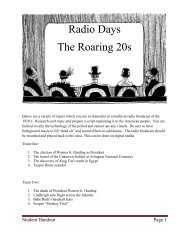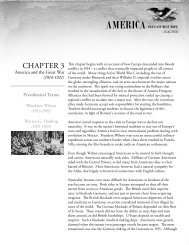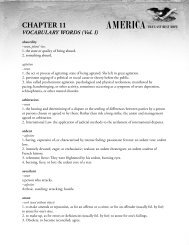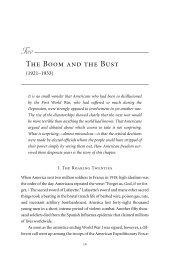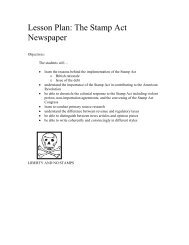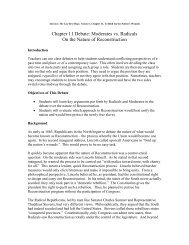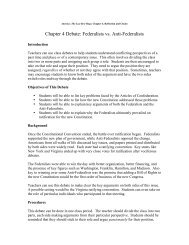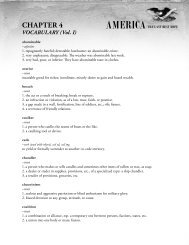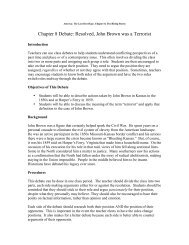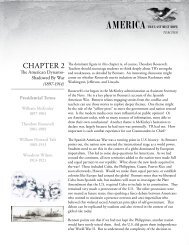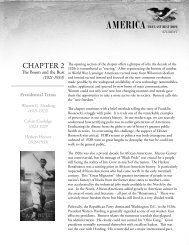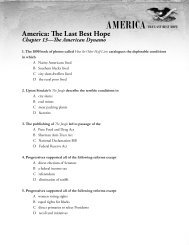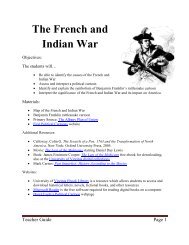AMERICA: THE LAST BEST HOPE CHAPTER 12 VOCABULARY ...
AMERICA: THE LAST BEST HOPE CHAPTER 12 VOCABULARY ...
AMERICA: THE LAST BEST HOPE CHAPTER 12 VOCABULARY ...
Create successful ePaper yourself
Turn your PDF publications into a flip-book with our unique Google optimized e-Paper software.
anguish–noun<strong>AMERICA</strong>: <strong>THE</strong> <strong>LAST</strong> <strong>BEST</strong> <strong>HOPE</strong>excruciating or acute distress, suffering, or pain: the anguish of grief.–verb (used with object)to inflict with distress, suffering, or pain.–verb (used without object)to suffer, feel, or exhibit anguish: to anguish over the loss of a loved one.annihilate–verb1. to reduce to utter ruin or nonexistence; destroy utterly: The heavy bombing almost annihilated thecity.2. to destroy the collective existence or main body of; wipe out: to annihilate an army.anti-Semitic–adjectivea position of discrimination against or prejudice or hostility toward Jews.apartheid–noun1. (in the Republic of South Africa) a rigid policy of segregation of the nonwhite population.2. any system or practice that separates people according to race, caste, etc.appall–verbto fill or overcome with horror, consternation, or fear; dismay: He was appalled by the damage fromthe fire. I am appalled at your mistakes.apparat–nounan organization or existing power structure, esp. a political one: a position of leadership within theparty apparat; The chess apparat is not eager to change tournament rules.apparatchik–noun,a member of an apparat (leadership organization), esp. in a Communist country.Armageddon–noun1. the place where the final battle will be fought between the forces of good and evil (probably socalled in reference to the battlefield of Megiddo. Rev. 16:16).2. the last and completely destructive battle: The arms race can lead to Armageddon.3. any great and crucial conflict.
arrogated–verb (used with object)<strong>AMERICA</strong>: <strong>THE</strong> <strong>LAST</strong> <strong>BEST</strong> <strong>HOPE</strong>1. to claim unwarrantably or presumptuously; assume or appropriate to oneself without right: toarrogate the right to make decisions.2. to attribute or assign to another; ascribe.atheism–noun1. the doctrine or belief that there is no God.2. disbelief in the existence of a supreme being or beings.articulate–adjective1. uttered clearly in distinct syllables.2. capable of speech; not speechless.3. using language easily and fluently; having facility with words: an articulate speaker.4. expressed, formulated, or presented with clarity and effectiveness: an articulate thought.asset–noun1. a useful and desirable thing or quality: Organizational ability is an asset.2. a single item of ownership having exchange value.3. assets, a. items of ownership convertible into cash; total resources of a person or business, as cash,notes and accounts receivable, securities, inventories, goodwill, fixtures, machinery, or real estate(opposed to liabilities).avid–adjective1. enthusiastic; ardent; dedicated; keen: an avid moviegoer.2. keenly desirous; eager; greedy (often fol. by for or of): avid for pleasure; avid of power.ballooning- adjective1. To expand or swell out like a balloon. Synonymous with bulge.2. To increase or rise quickly.barbarism–noun1. a barbarous or uncivilized state or condition.2. a barbarous act; something belonging to or befitting a barbarous condition.3. the use in a language of forms or constructions felt by some to be undesirably alien to theestablished standards of the language.bedrock–noun
constituency–noun, plural -cies.<strong>AMERICA</strong>: <strong>THE</strong> <strong>LAST</strong> <strong>BEST</strong> <strong>HOPE</strong>1. a body of constituents; the voters or residents in a district represented by an elective officer.2. the district itself.3. any body of supporters, customers, etc.; clientele.constrict–verb (used with object)1. to draw or press in; cause to contract or shrink; compress.2. to slow or stop the natural course or development of: Greed and aggressiveness constricted thenation’s cultural life.counterweight–nouna weight used as a counterbalance.–verb (used with object)to balance or equip with a counterweight.crag–nouna steep, rugged rock; rough, broken, projecting part of a rock.credulous–adjective1. willing to believe or trust too readily, esp. without proper or adequate evidence; gullible.2. marked by or arising from credulity: a credulous rumor.criminalize–verb (used with object), -ized, -iz ing.1. to make punishable as a crime: To reduce the graffiti on subway cars, he wants to criminalize theselling of spray paint to minors.2. to make a criminal of: Drug use has criminalized him.cull–verb (used with object)1. to choose; select; pick.2. to gather the choice things or parts from.3. to collect; gather; pluck.culpable–adjectivedeserving blame or censure; blameworthy.dashed–adjective, adverb Chiefly British.
2. to testify or affirm under oath, esp. in a writtenstatement: to depose that it was true. <strong>AMERICA</strong>: <strong>THE</strong> <strong>LAST</strong> <strong>BEST</strong> <strong>HOPE</strong>3. Law. to take the deposition of; examine under oath: Two lawyers deposed the witness.–verb (used without object)to give sworn testimony, esp. in writing.deranged–adjective1. INSANE.2. disordered; disarranged.devoid–adjectivenot possessing, untouched by, void, or destitute (usually fol. by of).–verb (used with object)to deplete or strip of some quality or substance: imprisonment that devoids a person of humanity.diminutive–adjective1. small; little; tiny: a diminutive building for a model-train layout.2. Grammar. pertaining to or productive of a form denoting smallness, familiarity, affection, ortriviality, as the suffix -let, in droplet from drop.disconcerting-verb1. to upset the self-possession of; ruffle. Synonym - embarrass.2. to frustrate (plans, for example) by throwing into disorder; disarrange.discreditable-adjectiveharmful to one’s reputation; blameworthy: discreditable behavior.disengage–verb (used with object)1. to release from attachment or connection; loosen; unfasten: to disengage a clutch.2. to free (oneself) from an engagement, pledge, obligation, etc.: He accepted the invitation, but waslater forced to disengage himself.3. Military. to break off action with (an enemy).–verb (used without object)to become disengaged; free oneself.dishonorable–adjective1. showing lack of honor or integrity; ignoble; base; disgraceful; shameful: Cheating is dishonorable.2. having no honor or good repute; unprincipled; disreputable: a dishonorable man.
1. to dig (something buried, esp. a dead body) out ofthe earth; disinter.<strong>AMERICA</strong>: <strong>THE</strong> <strong>LAST</strong> <strong>BEST</strong> <strong>HOPE</strong>2. to revive or restore after neglect or a period of forgetting; bring to light: to exhume a literaryreputation; to exhume old letters.faux pas-noun; Pronunciation[foh pah]a slip or blunder in etiquette, manners, or conduct; an embarrassing social blunder or indiscretion.feckless–adjective1. ineffective; incompetent; futile: feckless attempts to repair the plumbing.2. having no sense of responsibility; indifferent; lazy.flagrant–adjective1. shockingly noticeable or evident; obvious; glaring: a flagrant error.2. notorious; scandalous: a flagrant crime; a flagrant offenderflummox-verbto confuse; perplex.formidable–adjective1. causing fear, apprehension, or dread: a formidable opponent.2. of discouraging or awesome strength, size, difficulty, etc.; intimidating: a formidable problem.3. arousing feelings of awe or admiration because of grandeur, strength, etc.4. of great strength; forceful; powerful: formidable opposition to the proposal.fractious–adjective1. refractory or unruly: a fractious animal that would not submit to the harness.2. readily angered; peevish; irritable; quarrelsome: an incorrigibly fractious young man.fundamentalist–noun1. ( Believer in a movement in American Protestantism that arose in the early part of the 20thcentury in reaction to modernism and that stresses the infallibility of the Bible not only in matters offaith and morals but also as a literal historical record, holding as essential to Christian faith belief insuch doctrines as the creation of the world, the virgin birth, physical resurrection, atonement by thesacrificial death of Christ, and the Second Coming.2. the beliefs held by those in this movement.3. Believer in strict adherence to any set of basic ideas or principles: the fundamentalism of theextreme conservatives.
gamely–adverbin a game or plucky manner: They struggled gamely.<strong>AMERICA</strong>: <strong>THE</strong> <strong>LAST</strong> <strong>BEST</strong> <strong>HOPE</strong>ghastly–adjective1. shockingly frightful or dreadful; horrible: a ghastly murder.2. resembling a ghost, esp. in being very pale: a ghastly look to his face.3. terrible; very bad: a ghastly error.grievous–adjective1. causing grief or great sorrow: grievous news.2. flagrant; outrageous; atrocious: a grievous offense against morality.3. full of or expressing grief; sorrowful: a grievous cry.4. burdensome or oppressive.5. causing great pain or suffering: arrested for causing grievous bodily harm to someone.gung-ho–adjectivewholeheartedly enthusiastic and loyal; eager; zealous: a gung-ho military outfit.–adverbin a successful manner: The business is going gung-ho.hack-noun1. a tool, as an ax, hoe, or pick, for hacking.2. a person, as an artist or writer, who exploits, for money, his or her creative ability or training in theproduction of dull, unimaginative, and trite work; one who produces banal and mediocre work in thehope of gaining commercial success in the arts: As a painter, he was little more than a hack.harass–verb (used with object)1. to disturb persistently; torment, as with troubles or cares; bother continually; pester; persecute.2. to trouble by repeated attacks, incursions, etc., as in war or hostilities; harry; raid.heedless–adjectivecareless; thoughtless; unmindful: Heedless of the danger, he returned to the burning building to savehis dog.hone–noun1. a whetstone of fine, compact texture for sharpening razors and other cutting tools.2. a precision tool with a mechanically rotated abrasive tip, for enlarging holes to precise dimensions.
–verb (used with object)1. to sharpen on a hone: to hone a carving knife. <strong>AMERICA</strong>: <strong>THE</strong> <strong>LAST</strong> <strong>BEST</strong> <strong>HOPE</strong>2. to enlarge or finish (a hole) with a hone.3. to make more acute or effective; improve; perfect: to hone one’s skills.hunker–verb (used without object)1. to squat on one’s heels (often fol. by down).2. Informal.a. to hunch: The driver hunkered over the steering wheel.b. to hide, hide out, or take shelter (usually fol. by down): The escaped convicts hunkereddown in a cave in the mountains.c. to hold resolutely or stubbornly to a policy, opinion, etc., when confronted by criticism,opposition, or unfavorable circumstances (usually fol. by down): Though all the evidencewas against him, he hunkered down and refused to admit his guilt.3. Slang. to lumber along; walk or move slowly or aimlessly.hustings–noun (used with a singular or plural verb )1. (before 1872) the temporary platform on which candidates for the British Parliament stood whennominated and from which they addressed the electors.2. any place from which political campaign speeches are made.3. the political campaign trail.4. Also called hustings court. a local court in certain parts of Virginia.hype–verb (used with object)1. to stimulate, excite, or agitate (usually fol. by up): She was hyped up at the thought of owning herown car.2. to create interest in by flamboyant or dramatic methods; promote or publicize showily: a promoterwho knows how to hype a prizefight.3. to intensify (advertising, promotion, or publicity) by ingenious or questionable claims, methods,etc. (usually fol. by up).4. to trick; gull.–noun1. exaggerated publicity; hoopla.2. an ingenious or questionable claim, method, etc., used in advertising, promotion, or publicity tointensify the effect.3. a swindle, deception, or trick.immersion–noun1. an act or instance of immersing.2. state of being immersed.3. state of being deeply engaged or involved; absorption.
4. baptism in which the whole body of theperson is submerged in the water. <strong>AMERICA</strong>: <strong>THE</strong> <strong>LAST</strong> <strong>BEST</strong> <strong>HOPE</strong>5. Also called ingress. Astronomy. the entrance of a heavenly body into an eclipse by anotherbody, an occultation, or a transit. Compare EMERSION (def. 1).–adjectiveconcentrating on one course of instruction, subject, or project to the exclusion of all others forseveral days or weeks; intensive: an immersion course in conversational French.impasse–noun1. a position or situation from which there is no escape; deadlock.2. a road or way that has no outlet; cul-de-sac.impassioned–adjectivefilled with intense feeling or passion; passionate; ardent.impregnable–adjective1. strong enough to resist or withstand attack; not to be taken by force, unconquerable: animpregnable fort.2. not to be overcome or overthrown: an impregnable argument.incapacitated–adjectiveunable to act, respond, or the like (often used euphemistically when one is busy or otherwiseoccupied): He can’t come to the phone now—he’s incapacitated.inclusive–adjective1. including the stated limit or extremes in consideration or account: from 6 to 37 inclusive.2. including a great deal, or including everything concerned; comprehensive: an inclusive artform; an inclusive fee.3. that includes; enclosing; embracing.4. Grammar. (of the first person plural) including the person or persons spoken to, as we in Shallwe dance?incumbent–adjective1. holding an indicated position, role, office, etc., currently: the incumbent officers of the club.2. obligatory (often fol. by on or upon): a duty incumbent upon me.3. Archaic. resting, lying, leaning, or pressing on something: incumbent upon the cool grass.–noun1. the holder of an office: The incumbent was challenged by a fusion candidate.2. British. a person who holds an ecclesiastical benefice.
indictment–noun<strong>AMERICA</strong>: <strong>THE</strong> <strong>LAST</strong> <strong>BEST</strong> <strong>HOPE</strong>1. an act of indicting.2. Law. a formal accusation initiating a criminal case, presented by a grand jury and usually requiredfor felonies and other serious crimes.3. any charge, accusation, serious criticism, or cause for blame.4. the state of being indicted.inevitable–adjective1. unable to be avoided, evaded, or escaped; certain; necessary: an inevitable conclusion.2. sure to occur, happen, or come; unalterable: The inevitable end of human life is death.–nounthat which is unavoidable.infusion–noun1. the act or process of infusing.2. something that is infused.3. a liquid extract, as tea, prepared by steeping or soaking.4. Pharmacology.a. the steeping or soaking of a crude drug in water.b. the liquid so prepared.5. Medicine/Medical.a. the introduction of a saline or other solution into a vein.b. the solution used.innate–adjective1. existing in one from birth; inborn; native: innate musical talent.2. inherent in the essential character of something: an innate defect in the hypothesis.3. originating in or arising from the intellect or the constitution of the mind, rather than learnedthrough experience: an innate knowledge of good and evil.intimidate–verb (used with object)1. to make timid; fill with fear.2. to overawe or cow, as through the force of personality or by superior display of wealth, talent, etc.3. to force into or deter from some action by inducing fear: to intimidate a voter into staying awayfrom the polls.invincible–adjective1. incapable of being conquered, defeated, or subdued.2. insuperable; insurmountable: invincible difficulties.
irreverent–adjective<strong>AMERICA</strong>: <strong>THE</strong> <strong>LAST</strong> <strong>BEST</strong> <strong>HOPE</strong>not reverent; manifesting or characterized by irreverence; deficient in veneration or respect: anirreverent reply.jubilant–adjectiveshowing great joy, satisfaction, or triumph; rejoicing; exultant: the cheers of the jubilant victors; thejubilant climax of his symphony.jurisprudence–noun1. the science or philosophy of law.2. a body or system of laws.3. a department of law: medical jurisprudence.4. Civil Law. decisions of courts, esp. of reviewing tribunals.keen–adjective,1. finely sharpened, as an edge; so shaped as to cut or pierce substances readily: a keen razor.2. sharp, piercing, or biting: a keen wind; keen satire.3. characterized by strength and distinctness of perception; extremely sensitive or responsive: keeneyes; keen ears.4. having or showing great mental penetration or acumen: keen reasoning; a keen mind.5. animated by or showing strong feeling or desire: keen competition.6. intense, as feeling or desire: keen ambition; keen jealousy.7. eager; interested; enthusiastic (often fol. by about, on, etc., or an infinitive): She is really keen ongoing swimming.8. Slang. great; wonderful; marvelous.languish–verb (used without object)1. to be or become weak or feeble; droop; fade.2. to lose vigor and vitality.3. to undergo neglect or experience prolonged inactivity; suffer hardship and distress: to languish inprison for ten years.4. to be subjected to delay or disregard; be ignored: a petition that languished on the warden’s deskfor a year.5. to pine with desire or longing.6. to assume an expression of tender, sentimental melancholy.–noun1. the act or state of languishing.2. a tender, melancholy look or expression.
liable–adjective<strong>AMERICA</strong>: <strong>THE</strong> <strong>LAST</strong> <strong>BEST</strong> <strong>HOPE</strong>1. legally responsible: You are liable for the damage caused by your action.2. subject or susceptible: to be liable to heart disease.3. likely or apt: He’s liable to get angry.lightning rod–noun1. a rodlike conductor installed to divert lightning away from a structure by providing a direct pathto the ground.2. a person or thing that attracts and absorbs powerful and esp. negative or hostile feelings, opinions,etc., thereby diverting such feelings from other targets: The unpopular supervisor served as alightning rod for the criticism that should have been aimed at management.malevolence–nounthe quality, state, or feeling of being malevolent; ill will; malice; hatred.materialism–noun1. preoccupation with or emphasis on material objects, comforts, and considerations, with adisinterest in or rejection of spiritual, intellectual, or cultural values.2. the philosophical theory that regards matter and its motions as constituting the universe, and allphenomena, including those of mind, as due to material agencies.miff–noun1. petulant displeasure; ill humor.2. a petty quarrel.–verb (used with object)to give minor offense to; offend.momentous–adjectiveof great or far-reaching importance or consequence: a momentous day.moribund–adjective1. in a dying state; near death.2. on the verge of extinction or termination.3. not progressing or advancing; stagnant: a moribund political party.morsel–noun1. a bite, mouthful, or small portion of food, candy, etc.
2. a small piece, quantity, or amount of anything;scrap; bit.<strong>AMERICA</strong>: <strong>THE</strong> <strong>LAST</strong> <strong>BEST</strong> <strong>HOPE</strong>3. something very appetizing; treat or tidbit.4. a person or thing that is attractive or delightful.–verb (used with object)to distribute in or divide into tiny portions (often fol. by out): to morsel out the last pieces of meat.naïve–adjective1. having or showing unaffected simplicity of nature or absence of artificiality; unsophisticated;ingenuous.2. having or showing a lack of experience, judgment, or information; credulous: She’s so naive shebelieves everything she reads. He has a very naive attitude toward politics.3. having or marked by a simple, unaffectedly direct style reflecting little or no formal training ortechnique: valuable naive 19th-century American portrait paintings.4. not having previously been the subject of a scientific experiment, as an animal.nauseate–verb (used with object)1. to affect with nausea; sicken.2. to cause to feel extreme disgust: His vicious behavior toward the dogs nauseates me.–verb (used without object)to become affected with nausea.non sequitur–noun1. Logic. an inference or a conclusion that does not follow from the premises.2. a statement containing an illogical conclusion.notorious–adjective1. widely and unfavorably known: a notorious gambler.2. publicly or generally known, as for a particular trait: a newspaper that is notorious for itssensationalism.obsessed–adjective1. having an obsession (usually fol. by with or by): He is obsessed with eliminating guilt.2. having or displaying signs of an obsession: The audiophile entered the record store wearing anobsessed smile.-intr. verbto have the mind excessively preoccupied with a single emotion or topicodium–noun
1. intense hatred or dislike, esp. toward a person orthing regarded as contemptible, despicable, or repugnant. <strong>AMERICA</strong>: <strong>THE</strong> <strong>LAST</strong> <strong>BEST</strong> <strong>HOPE</strong>2. the reproach, discredit, or opprobrium attaching to something hated or repugnant: He had to bearthe odium of neglecting his family.3. the state or quality of being hated.orchestrate–verb (used with object)1. to compose or arrange (music) for performance by an orchestra.2. to arrange or manipulate, esp. by means of clever or thorough planning or maneuvering: toorchestrate a profitable trade agreement.ossify–verb (used with object)to convert into or cause to harden like bone.–verb (used without object)1. to become bone or harden like bone.2. to become rigid or inflexible in habits, attitudes, opinions, etc.: a young man who began to ossifyright after college.outmaneuver–verb (used with object)1. to outwit, defeat, or frustrate by maneuvering.2. to outdo or surpass in maneuvering or maneuverability.palpable–adjective1. readily or plainly seen, heard, perceived, etc.; obvious; evident: a palpable lie; palpable absurdity.2. capable of being touched or felt; tangible.3. Medicine/Medical. perceptible by palpation.parody–noun1. a humorous or satirical imitation of a serious piece of literature or writing: his hilarious parody ofHamlet’s soliloquy.2. the genre of literary composition represented by such imitations.3. a burlesque imitation of a musical composition.4. any humorous, satirical, or burlesque imitation, as of a person, event, etc.5. the use in the 16th century of borrowed material in a musical setting of the Mass (parody Mass).6. a poor or feeble imitation or semblance; travesty: His acting is a parody of his past greatness.–verb (used with object)1. to imitate (a composition, author, etc.) for purposes of ridicule or satire.2. to imitate poorly or feebly; travesty.
partisan–noun<strong>AMERICA</strong>: <strong>THE</strong> <strong>LAST</strong> <strong>BEST</strong> <strong>HOPE</strong>1. an adherent or supporter of a person, group, party, or cause, esp. a person who shows a biased,emotional allegiance.2. Military. a member of a party of light or irregular troops engaged in harassing an enemy, esp. amember of a guerrilla band engaged in fighting or sabotage against an occupying army.–adjective1. of, pertaining to, or characteristic of partisans; partial to a specific party, person, etc.: partisanpolitics.2. of, pertaining to, or carried on by military partisans or guerrillas.patronize–verb (used with object),1. to give (a store, restaurant, hotel, etc.) one’s regular patronage; trade with.2. to behave in an offensively condescending manner toward: a professor who patronizes his students.3. to act as a patron toward (an artist, institution, etc.); support.perennial–adjective1. lasting for an indefinitely long time; enduring: her perennial beauty.2. (of plants) having a life cycle lasting more than two years.3. lasting or continuing throughout the entire year, as a stream.4. perpetual; everlasting; continuing; recurrent.–noun1. a perennial plant: Daffodils and tulips are perennials.2. something that is continuing or recurrent.periphery–noun,1. the external boundary of any surface or area.2. the external surface of a body.3. the edge or outskirts, as of a city or urban area.4. the relatively minor, irrelevant, or superficial aspects of the subject in question: The preliminaryresearch did not, of course, take me beyond the periphery of my problem.pilloried-verbto be placed in a wooden framework erected on a post, with holes for securing the head and hands,formerly used to expose an offender to public derision.–verb (used with object)1. to be set in the pillory.2. to be exposed to public derision, ridicule, or abuse: The candidate mercilessly pilloried hisopponent.
plumed-adjective<strong>AMERICA</strong>: <strong>THE</strong> <strong>LAST</strong> <strong>BEST</strong> <strong>HOPE</strong>1. having a feather.2. having a large, long, or conspicuous feather: the brilliant plume of a peacock.3. adorned with a soft, fluffy feather: the plume of an egret.4. being bestowed with any plumose part or formation.5. having a feather, a tuft of feathers, or some substitute, worn as an ornament, as on a hat, helmet,etc.6. having a feather or featherlike token of honor or distinction, esp. one worn on a helmet.7 having a plumagepolenta–noun(esp. in Italian cooking) a thick mush of cornmeal.pomp–noun1. stately or splendid display; splendor; magnificence.2. ostentatious or vain display, esp. of dignity or importance.3. pomps, pompous displays, actions, or things: The official was accompanied by all the pomps of hishigh position.4. Archaic. a stately or splendid procession; pageant.ponderous–adjective1. of great weight; heavy; massive.2. awkward or unwieldy: He carried a ponderous burden on his back.3. dull and labored: a ponderous dissertation.pontiff–noun1. any pontifex.2. any high or chief priest.3. Ecclesiastical.a. a bishop.b. the Roman Catholic pope, the Bishop of Rome.predilection–nouna tendency to think favorably of something in particular; partiality; preference: a predilection forBach.preponderance–nounthe fact or quality of being preponderant; superiority in weight, power, numbers, etc.: The
preponderance of votes is against the proposal.<strong>AMERICA</strong>: <strong>THE</strong> <strong>LAST</strong> <strong>BEST</strong> <strong>HOPE</strong>prod–verb (used with object)1. to poke or jab with or as if with something pointed: I prodded him with my elbow.2. to rouse or incite as if by poking; nag; goad.–noun1. the act of prodding; a poke or jab.2. any of various pointed instruments used as a goad, esp. an electrified rod that administers a mildshock: a cattle prod.quip–noun1. a clever or witty remark or comment.2. a sharp, sarcastic remark; a cutting jest.3. a quibble.4. an odd or fantastic action or thing.rapport–nounrelation; connection, esp. harmonious or sympathetic relation: a teacher trying to establish closerapport with students.raison d’être-nounreason or justification for being or existence: Art is the artist’s raison d’être.rationed-verb1. to be supplied a fixed portion, especially an amount of food allotted to persons in military serviceor to civilians in times of scarcity.2, to be supplied with rations or food issued or available to members of a group.rebound–verb (used without object)1. to bound or spring back from force of impact.2. to recover, as from ill health or discouragement.–verb (used with object)1. to cause to bound back; cast back.2. the act of rebounding; recoil.rebuke–verb (used with object)to express sharp, stern disapproval of; reprove; reprimand.–noun
sharp, stern disapproval; reproof; reprimand.reconciliation–noun1. an act of reconciling or the state of being reconciled.2. the process of making consistent or compatible.<strong>AMERICA</strong>: <strong>THE</strong> <strong>LAST</strong> <strong>BEST</strong> <strong>HOPE</strong>redoubtable–adjective1. that is to be feared; formidable.2. commanding or evoking respect, reverence, or the like.reinstituted- verbto bring back from being discontinued or abandoned. He re-instituted the rules that were changed inthe previous year.reiterate–verb (used with object)to say or do again or repeatedly; repeat, often excessively.reluctance–noun1. unwillingness; disinclination: reluctance to speak in public.2. Electricity. the resistance to magnetic flux offered by a magnetic circuit, determined by thepermeability and arrangement of the materials of the circuit.repent–verb (used without object)1. to feel sorry, self-reproachful, or contrite for past conduct; regret or be conscience-stricken about apast action, attitude, etc. (often fol. by of): He repented after his thoughtless act.2. to feel such sorrow for sin or fault as to be disposed to change one’s life for the better; be penitent.–verb (used with object)1. to remember or regard with self-reproach or contrition: to repent one’s injustice to another.2. to feel sorry for; regret: to repent an imprudent act.rescinding-verbthe act of voiding; repealing or annuling.resolve–verb (used with object)to come to a definite or earnest decision about; determine (to do something): I have resolved that Ishall live to the full.
esplendent–adjective<strong>AMERICA</strong>: <strong>THE</strong> <strong>LAST</strong> <strong>BEST</strong> <strong>HOPE</strong>shining brilliantly; gleaming; splendid: troops resplendent in white uniforms; resplendent virtues.retrofit–verb (used with object)1. to modify equipment (in airplanes, automobiles, a factory, etc.) that is already in service usingparts developed or made available after the time of original manufacture.2. to install, fit, or adapt (a device or system) for use with something older: to retrofit solar heating toa poorly insulated house.–verb (used without object)1. (of new or modified parts, equipment, etc.) to fit into or onto existing equipment.2. to replace existing parts, equipment, etc., with updated parts or systems.–noun1. something that has been retrofitted.2. an instance of updating, enlarging, etc., with new or modified equipment: A retrofit could savethousands of dollars.–adjectivebeing or characterized by a retrofit: retrofit units.revel–verb (used without object)1. to take great pleasure or delight (usually fol. by in): to revel in luxury.2. to make merry; indulge in boisterous festivities.–noun1. boisterous merrymaking or festivity; revelry.2. Often, revels. an occasion of merrymaking or noisy festivity with dancing, masking, etc.reverie–noun1. a state of dreamy meditation or fanciful musing: lost in reverie.2. a daydream.3. a fantastic, visionary, or impractical idea: reveries that will never come to fruition.4. Music. an instrumental composition of a vague and dreamy character.rhetoric–noun1. (in writing or speech) the undue use of exaggeration or display; bombast.2. the art or science of all specialized literary uses of language in prose or verse, including the figuresof speech.3. the study of the effective use of language.4. the ability to use language effectively.5. the art of prose in general as opposed to verse.6. the art of making persuasive speeches; oratory.7. (in classical oratory) the art of influencing the thought and conduct of an audience.
8. (in older use) a work on rhetoric.<strong>AMERICA</strong>: <strong>THE</strong> <strong>LAST</strong> <strong>BEST</strong> <strong>HOPE</strong>ricocheted–nounthe motion of an object or a projectile in rebounding or deflecting one or more times from thesurface over which it is passing or against which it hits a glancing blow.–verb (used without object)to move in this way, as a projectile.rogue–noun1. a dishonest, knavish person; scoundrel.2. a playfully mischievous person; scamp: The youngest boys are little rogues.3. a tramp or vagabond.4. a rogue elephant or other animal of similar disposition.5. Biology. a usually inferior organism, esp. a plant, varying markedly from the normal.–verb (used without object)to live or act as a rogue.–verb (used with object)1. to cheat.2. to uproot or destroy (plants, etc., that do not conform to a desired standard).3. to perform this operation upon: to rogue a field.rubble–noun1. broken bits and pieces of anything, as that which is demolished: Bombing reduced the town torubble.2. any solid substance, as ice, in irregularly broken pieces.3. rough fragments of broken stone, formed by geological processes, in quarrying, etc., andsometimes used in masonry.4. masonry built of rough fragments of broken stone.sassy-adjective1. rude and disrespectful; impudent.2. lively and spirited; jaunty.3. stylish; chic: a sassy little hat.satirical–adjective1. of, pertaining to, containing, or characterized by satire: satirical novels.2. indulging in or given to satire: a satirical poet.schadenfreude–noun
satisfaction or pleasure felt at someone else’s misfortune.sclerotic-adjective1. affected or marked by sclerosis.2. Anatomy Of or relating to the sclera.<strong>AMERICA</strong>: <strong>THE</strong> <strong>LAST</strong> <strong>BEST</strong> <strong>HOPE</strong>scowl–verb (used without object)1. to draw down or contract the brows in a sullen, displeased, or angry manner.2. to have a gloomy or threatening look.–verb (used with object)to affect or express with a scowl.–nouna scowling expression, look, or aspect.secular–adjective1. of or pertaining to worldly things or to things that are not regarded as religious, spiritual, orsacred; temporal: secular interests.2. not pertaining to or connected with religion (opposed to SACRED): secular music.shrewd–adjective,1. astute or sharp in practical matters: a shrewd politician.2. keen; piercing.shun–verb (used with object),to keep away from (a place, person, object, etc.), from motives of dislike, caution, etc.; take pains toavoid.simplistic–adjectivecharacterized by extreme simplism; oversimplified: a simplistic notion of good and bad.simultaneous–adjectiveexisting, occurring, or operating at the same time; concurrent: simultaneous movements;simultaneous translation.skinflint-nouna mean person; a miser.
skirt-verb<strong>AMERICA</strong>: <strong>THE</strong> <strong>LAST</strong> <strong>BEST</strong> <strong>HOPE</strong>1. to border, wrap, or cover with a skirt or something suggesting a skirt in appearance or function.2. to pass along or around the border or edge of: Traffic skirts the town.3. to avoid, go around the edge of, or keep distant from (something that is controversial, risky, etc.):The senator skirted the issue.4. to remove low-grade wool and foreign matter from (the outer edge of fleece).–verb (used without object)1. to be or lie on or along the edge of something.2. to move along or around the border of something.skittish–adjective1. apt to start or shy: a skittish horse.2. restlessly or excessively lively: a skittish mood.3. fickle; uncertain.4. shy; coy.snatch–verb (used without object)to make a sudden effort to seize something, as with the hand; grab (usually fol. by at).–verb (used with object)1. to seize by a sudden or hasty grasp: He snatched the old lady’s purse and ran.2. to take, get, secure, etc., suddenly or hastily.3. to rescue or save by prompt action: He snatched the baby from the fire.4. Slang. to kidnap.solicit–verb (used with object)1. to seek for (something) by entreaty, earnest or respectful request, formal application, etc.: Hesolicited aid from the minister.2. to entreat or petition (someone or some agency): to solicit the committee for funds.3. to seek to influence or incite to action, esp. unlawful or wrong action.sophisticate-verb1. to cause to become less natural, especially to make less naive and more worldly.2. to make impure; adulterate.3. to make more complex or inclusive; refine.soporific–adjective1. causing or tending to cause sleep.2. pertaining to or characterized by sleep or sleepiness; sleepy; drowsy.–noun
something that causes sleep, as a medicine or drug.<strong>AMERICA</strong>: <strong>THE</strong> <strong>LAST</strong> <strong>BEST</strong> <strong>HOPE</strong>stalwart–adjective1. strongly and stoutly built; sturdy and robust.2. strong and brave; valiant: a stalwart knight.3. firm, steadfast, or uncompromising: a stalwart supporter of the U.N.–noun1. a physically stalwart person.2. a steadfast or uncompromising partisan: They counted on the party stalwarts for support in theoff-year campaigns.staunch–adjective,1. firm or steadfast in principle, adherence, loyalty, etc., as a person: a staunch Republican; a staunchfriend.2. characterized by firmness, steadfastness, or loyalty: He delivered a staunch defense of thegovernment.3. strong; substantial: a staunch little hut in the woods.4. impervious to water or other liquids; watertight: a staunch vessel.stead–noun1. the place of a person or thing as occupied by a successor or substitute: The nephew of the queencame in her stead.2. Obsolete. a place or locality.–verb (used with object)to be of service, advantage, or avail to.—Idiomstand in good stead, to be useful to, esp. in a critical situation: Your experience will stand you ingood stead.steerage–noun1. a part or division of a ship, formerly the part containing the steering apparatus.2. (in a passenger ship) the part or accommodations allotted to the passengers who travel at thecheapest rate.stimulate–verb (used with object)1. to rouse to action or effort, as by encouragement or pressure; spur on; incite: to stimulate hisinterest in mathematics.2. Physiology, Medicine/Medical. to excite (a nerve, gland, etc.) to its functional activity.3. to invigorate (a person) by a food or beverage containing a stimulant, as coffee, tea, or alcoholicliquor.
–verb (used without object)to act as a stimulus or stimulant.<strong>AMERICA</strong>: <strong>THE</strong> <strong>LAST</strong> <strong>BEST</strong> <strong>HOPE</strong>strategy–noun1. Also, strategics. the science or art of combining and employing the means of war in planning anddirecting large military movements and operations.2. the use or an instance of using this science or art.3. skillful use of a stratagem: The salesperson’s strategy was to seem always to agree with thecustomer.4. a plan, method, or series of maneuvers or stratagems for obtaining a specific goal or result: astrategy for getting ahead in the world.stealthily-adverbmoving with, marked by, or acting with quiet, caution, and secrecy intended to avoid notice. SeeSynonyms at secret.swoon–verb (used without object)1. to faint; lose consciousness.2. to enter a state of hysterical rapture or ecstasy: The teenagers swooned at the sight of the singingstar.tapestry–noun1. a fabric consisting of a warp upon which colored threads are woven by hand to produce a design,often pictorial, used for wall hangings, furniture coverings, etc.2. a machine-woven reproduction of this.–verb (used with object)1. to furnish, cover, or adorn with tapestry.2. to represent or depict in a tapestry.throng–noun1. a multitude of people crowded or assembled together; crowd.2. a great number of things crowded or considered together: a throng of memoriestotalitarianism–noun1. the practices and principles of a totalitarian regime.2. absolute control by the state or a governing branch of a highly centralized institution.3. the character or quality of an autocratic or authoritarian individual, group, or government: thetotalitarianism of the father.
tourniquet–noun<strong>AMERICA</strong>: <strong>THE</strong> <strong>LAST</strong> <strong>BEST</strong> <strong>HOPE</strong>1. Medicine/Medical, Surgery. any device for arresting bleeding by forcibly compressing a bloodvessel, as a bandage tightened by twisting.2. a device for pulling the parts of a wooden piece of furniture together, consisting of a pair oftwisted cords passed around the parts.tumultuous–adjective1. full of tumult or riotousness; marked by disturbance and uproar: a tumultuous celebration.2. raising a great clatter and commotion; disorderly or noisy: a tumultuous crowd of students.3. highly agitated, as the mind or emotions; distraught; turbulent.unadorned-adjectivewithout adornment or embellishment; simple or plain.uncensored-adjectivenot examined, expurgated, or given a rating for inclusion of improper or inappropriate material:received uncensored correspondence from a theater of military operations; sells uncensored moviesand novels.undeterred-adjectivenot held back or restrained, not deterred; “pursued his own path...undeterred by lack of popularappreciation and understanding”unfiltered–adjectivenot screened or censored in any manner.unperceived-adjectivenot expected, not perceived or commented onunsavory–adjective1. not savory; tasteless or insipid: an unsavory meal.2. unpleasant in taste or smell; distasteful.3. unappealing or disagreeable, as a pursuit: Poor teachers can make education unsavory.4. socially or morally objectionable or offensive: an unsavory past; an unsavory person.unscrupulous–adjective
not scrupulous; unrestrained by scruples;conscienceless; unprincipled.<strong>AMERICA</strong>: <strong>THE</strong> <strong>LAST</strong> <strong>BEST</strong> <strong>HOPE</strong>vague–adjective1. not clearly or explicitly stated or expressed: vague promises.2. indefinite or indistinct in nature or character, as ideas or feelings: a vague premonition of disaster.3. not clear or distinct to the sight or any other sense; perceptible or recognizable only in anindefinite way: vague shapes in the dark; vague murmurs behind a door.vanguard–noun1. the foremost division or the front part of an army; advance guard; van.2. the forefront in any movement, field, activity, or the like.3. the leaders of any intellectual or political movement.vigorous–adjective1. full of or characterized by vigor: a vigorous effort.2. strong; active; robust: a vigorous youngster.3. energetic; forceful: vigorous steps; a vigorous personality.4. powerful in action or effect: vigorous law enforcement.vilification–noun1. the act of speaking ill of; defaming; slandering2. the act of making obsolete. to make vile.vulnerability–noun1. A condition capable of or susceptible to being wounded or hurt, as by a weapon: a vulnerable partof the body.2. A condition open to moral attack, criticism, temptation, etc.: an argument vulnerable torefutation; He is vulnerable to bribery.3. (of a place) a condition open to assault; difficult to defend: a vulnerable bridge.wade–verb (used without object)1. to walk in water, when partially immersed: He wasn’t swimming, he was wading.2. to play in water: The children were wading in the pool most of the afternoon.3. to walk through water, snow, sand, or any other substance that impedes free motion or offersresistance to movement: to wade through the mud.4. to make one’s way slowly or laboriously (often fol. by through): to wade through a stack of papers.
wag–verb (used with object)<strong>AMERICA</strong>: <strong>THE</strong> <strong>LAST</strong> <strong>BEST</strong> <strong>HOPE</strong>1. to move from side to side, forward and backward, or up and down, esp. rapidly and repeatedly: adog wagging its tail.2. to get along; travel; proceed: Let the world wag how it will.3. to totter or sway.4. British Slang. to play truant; play hooky.–nouna person given to droll, roguish, or mischievous humor; wit.wan–adjective1. of an unnatural or sickly pallor; pallid; lacking color: His wan face suddenly flushed.2. showing or suggesting ill health, fatigue, unhappiness, etc.: a wan look; a wan smile.3. lacking in forcefulness, competence, or effectiveness: their wan attempts to organize the alumni.witticism-nouna message whose ingenuity or verbal skill or incongruity has the power to evoke laughter [syn: wit]zealous–adjectivefull of, characterized by, or due to zeal; ardently active, devoted, or diligent.



